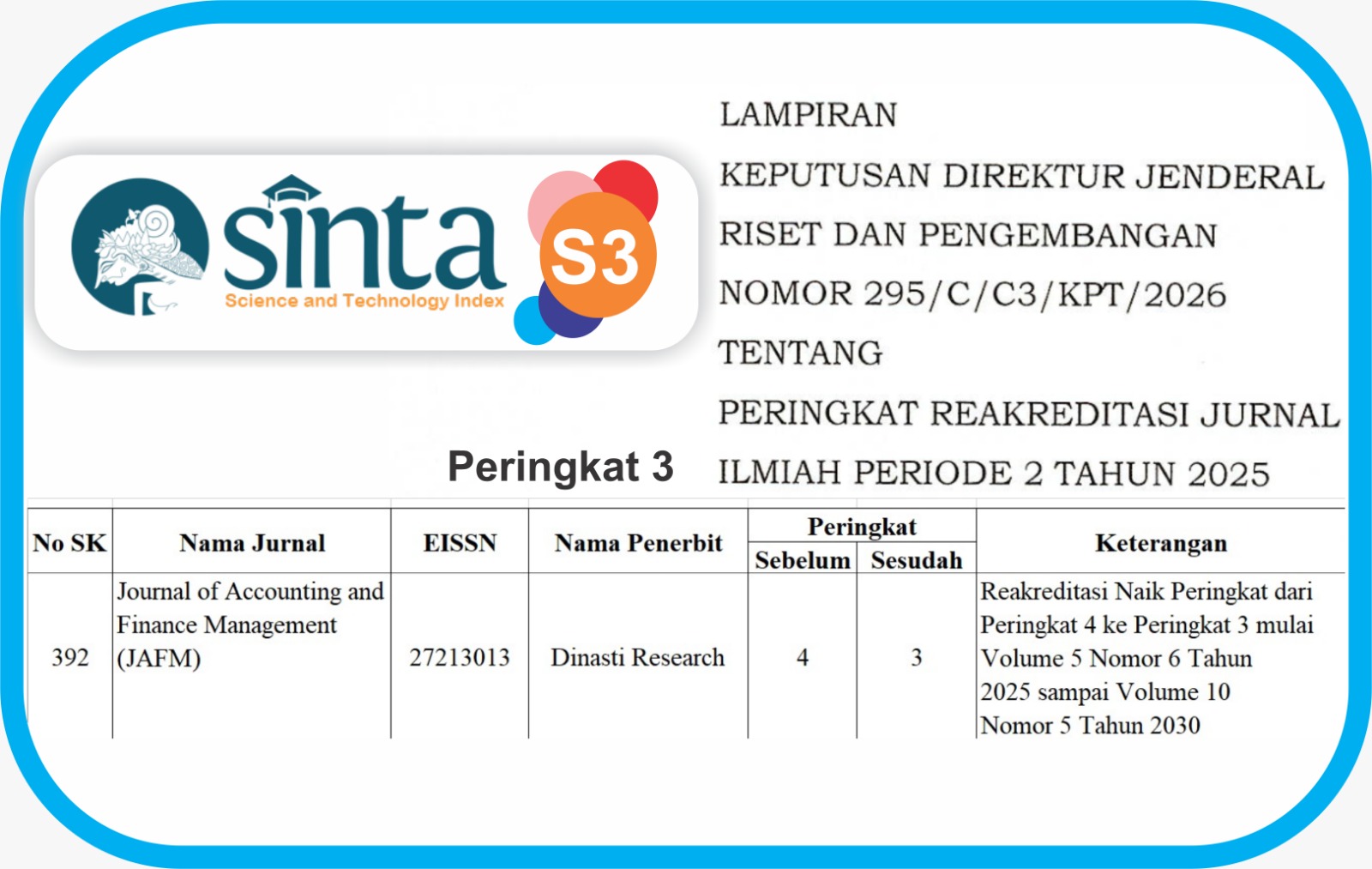The Effect of Transfer Pricing, Profitability and Political Connections on Tax Aggressiveness with Gender Diversity as a Moderating Variable
DOI:
https://doi.org/10.38035/jafm.v6i5.2705Keywords:
Transfer Pricing, Profitability, Political Connections, Gender Diversity, Tax AggressivenessAbstract
This study aims to explore the impact of transfer pricing, profitability, and political connections on the level of tax aggressiveness, considering gender diversity as a moderating factor. The research sample consists of mining companies listed on the Indonesia Stock Exchange (IDX) during the period 2017 to 2022. The sample was selected using a purposive sampling method, resulting in 142 mining companies. The data used in this study are secondary, obtained from audited financial reports available at www.idx.co.id. Data analysis was performed using the MRA technique using IBM SPSS 22 statistical software. Transfer pricing is proxied by (TP), Profitability is proxied by (ROA), political connections are proxied by (dummy), tax aggressiveness is proxied by (ETR), gender diversity is proxied with (GD). Transfer pricing does not significantly affect tax aggressiveness, whereas profitability has a significantly positive affect, political connections do not significantly influence tax aggressiveness, gender diversity does not moderate the effect of transfer pricing on tax aggressiveness, but it strenghnes the relationship between profitability and tax aggressiveness, and weakens the effect of political connections on tax aggressiveness.
References
Adegbite, T. A., & Bojuwon, M. (2019). Corporate Tax Avoidance Practices: An Empirical Evidence from Nigerian Firms. Studia Universitatis Babes-Bolyai Oeconomica, 64(3), 39–53. https://doi.org/10.2478/subboec-2019-0014
Amidu, M., Coffie, W., & Acquah, P. (2019). Transfer pricing, earnings management and tax avoidance of firms in Ghana. Journal of Financial Crime, 26(1), 235–259. https://doi.org/10.1108/JFC-10-2017-0091
Anggelina, B., Trisnawati, E., & Firmansyah, A. (2022). Factors Influencing Tax Aggressiveness: How Does Board Gender Diversity Affect It? E-Journal of Accounting, 32(4), 912. https://doi.org/10.24843/eja.2022.v32.i04.p07
Darmayanti, PPB, & Lely Aryani Merkusiawati, NK (2019). The Effect of Company Size, Profitability, Political Connections, and Corporate Social Responsibility Disclosure on Tax Avoidance. E-Journal of Accounting, 26, 1992. https://doi.org/10.24843/eja.2019.v26.i03.p12
Fadillah, AN, & Lingga, IS (2021). The Effect of Transfer Pricing and GCG on Tax Aggressiveness in Manufacturing Companies Listed on the Indonesia Stock Exchange. Journal of Accounting, 13(November), 332–343.
Hariani, Silpa Latipah; Waluyo, W. (2019). Effect of profitability, leverage and company size on tax avoidance. International Journal of Innovation, Creativity and Change, 6(8), 26–35. https://doi.org/10.21276/sb.2019.5.8.2
Harnovinsah, H., & Mubarakah, S. (2017). The Impact of Tax Accounting Choices on Tax Aggressiveness. Journal of Accounting, 20(2), 267. https://doi.org/10.24912/ja.v20i2.58
Herianti, E., & Chairina, SW (2019). Does Transfer Pricing Improve the Tax Avoidance through Financial Reporting Aggressiveness? KnE Social Sciences, 2019, 357–376. https://doi.org/10.18502/kss.v3i26.5387
Khoirunnisa Asadanie, N., & Venusita, L. (2020). The Influence of Political Connections on Tax Avoidance. Inventory: Journal of Accounting, 4(1), 14. https://doi.org/10.25273/inventory.v4i1.6296
Kim, C. (Francis), & Zhang, L. (2013). Corporate Political Connections and Tax Aggressiveness. SSRN Electronic Journal. https://doi.org/10.2139/ssrn.2303836
Napitupulu, IH, Situngkir, A., & Arfanni, C. (2020). The Effect of Transfer Pricing and Profitability on Tax Avoidance. Accounting Review, 21(2), 126–141. https://doi.org/10.29313/ka.v21i2.6737
Nurrahmi, AD, & Rahayu, S. (2020). The Influence of Business Strategy, Transfer Pricing, and Political Connections on Tax Avoidance. JAE (Journal of Accounting & Economics), 5(2), 48–57.
Rahman, HA (2021). Tax Aggressiveness and Its Influencing Factors. Online Journal of Accountants, 6(2), 195. https://doi.org/10.51211/joia.v6i2.1576
Richardson, G., Taylor, G., & Lanis, R. (2015). The impact of financial distress on corporate tax avoidance spanning the global financial crisis: Evidence from Australia. Economic Modelling, 44, 44–53. https://doi.org/10.1016/j.econmod.2014.09.015
Satiti, ADR, Syafik, M., & Widarjo, W. (2021a). Political Connections and Tax Aggressiveness: The Role of Gender Diversity as a Moderating Variable. Accounting, Auditing & Information Research Media, 21(2), 273–292. https://doi.org/10.25105/mraai.v21i2.9794
Satiti, ADR, Syafik, M., & Widarjo, W. (2021b). Political Connections and Tax Aggressiveness: The Role of Gender Diversity as a Moderating Variable. Accounting, Auditing & Information Research Media, 21(2), 273–292. https://doi.org/10.25105/mraai.v21i2.9794
Sudibyo, YA, & Jianfu, S. (2016). Political connections, state owned enterprises and tax avoidance: Anevidence from Indonesia. Corporate Ownership and Control, 13(3continued2), 279–283. https://doi.org/10.22495/cocv13i3c2p2
Sukrisno Agoes, APY (2019). Factors Influencing Tax Aggressiveness of Manufacturing Companies Listed on the IDX. Journal of Accounting Paradigms, 1(3), 979. https://doi.org/10.24912/jpa.v1i3.5603
Sulistiyanti, U., & Saputra, AD (2020). Determinants of tax avoidance: Evidence from Indonesian mining industry. Journal of Contemporary Accounting, 2(3), 165–174. https://doi.org/10.20885/jca.vol2.iss3.art5
Utami, W., & Rahman, HA (2021). Determinants of Tax Aggressiveness: Gender Diversity as Moderator. Archives of Business Research, 9(10), 223–237. https://doi.org/10.14738/abr.910.10985
Wicaksono, APN (2017). Political Connections and Tax Aggressiveness: A Phenomenon in Indonesia. Accountability, 10(1). https://doi.org/10.15408/akt.v10i1.5833
Downloads
Published
How to Cite
Issue
Section
License
Copyright (c) 2025 Nanik Nurjayanti, Wiwik Utami

This work is licensed under a Creative Commons Attribution 4.0 International License.
Authors who publish their manuscripts in this journal agree to the following conditions:
- The copyright on each article belongs to the author(s).
- The author acknowledges that the Journal of Accounting and Finance Management (JAFM) has the right to be the first to publish with a Creative Commons Attribution 4.0 International license (Attribution 4.0 International (CC BY 4.0).
- Authors can submit articles separately, arrange for the non-exclusive distribution of manuscripts that have been published in this journal into other versions (e.g., sent to the author's institutional repository, publication into books, etc.), by acknowledging that the manuscript has been published for the first time in the Journal of Accounting and Finance Management (JAFM).



























